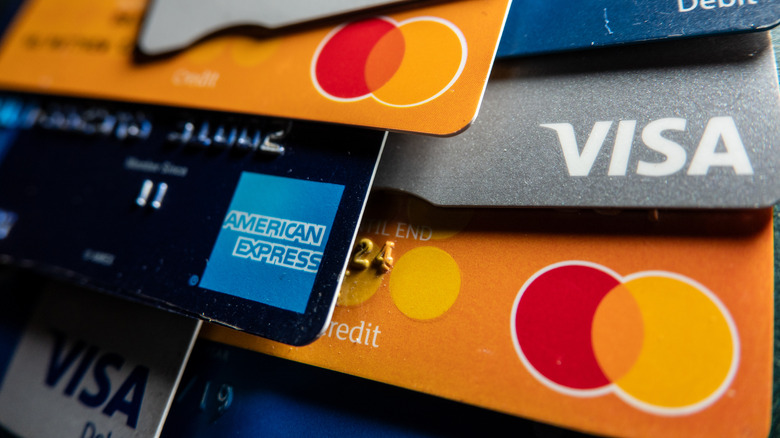You've Been Warned: Receiving A 'Minimum Payment Warning' From Your Credit Card Company Will Cost You
The allure of paying only the minimum due on a credit card bill can be tantalizing. Rather than spreading yourself thin, and only having a bit of cash to get you through to the next paycheck, putting down just the minimum can feel like the easier choice. This keeps money in your pocket, and can make things feel a little more stable in the moment. However, trouble can come quickly when you let your finances tilt towards this behavior. Only paying attention to the minimum payment warning included in your monthly credit card statement ultimately ensures that your next bill will be even more expensive, potentially by a significant figure.
The minimum payment warning included in your credit card statements likely comes with a table that tells you the total time to pay off your current balance — as well as the total you'll end up paying if you only pay the minimum. Paying each credit card bill you receive, in full, every month allows you to avoid any interest additions. However, if a month comes where you can't handle this financial burden, your balance can quickly continue to grow, even if you stop spending. Credit cards carry some of the most punishing interest rates found anywhere on the market. As of July 2025, the average card carries a rate of 25.3%, according to Forbes. Letting it slip for a month or two might not feel like a big issue, but the consequences can, and do, snowball.
Payoff schedules become extremely long, and costly
Paying the minimum might mean only contributing something in the neighborhood of $25 to your credit card balance — which might sound like a great option. However, this option is a terrible choice, even in the short term. The difference between a minimum payment and a slightly higher figure can add up to hundreds or even thousands of dollars, as well as many years of continued repayments to the same card company. It's not uncommon to see this warning showcase figures of 10 or more years of repayments at the minimum amount requirement as well as additional costs above the balance you currently carry. The end result is a lengthy repayment term that will ultimately see you paying interest even long after you've eliminated the principle cost of the purchase itself.
Instead of falling into a cycle of delivering small, and oftentimes inconsequential, payments to your card issuer every month for years on end, it's best to get aggressive about paying it off. There are many great strategies to help make paying off your debts easier. Financial experts like Dave Ramsey suggest putting everything else on the back burner in order to build up an emergency fund of $1,000 before spending your available cash paying off credit cards. While this won't work for everyone, the basic framework is certainly worth entertaining if you've been sending minimum payments.
Paying at the last minute can also affect costs
Seeing the minimum payment warning doesn't mean you're necessarily being 'warned' in the classic sense. But it does likely suggest that you're waiting until around your due date to make a contribution to the account. Keeping your credit card accounts in good standing, even if you aren't paying the balance off in full, is essential to maintaining a good credit score. However, there's something else to consider when making these payments.
Carrying a balance means that the card issuer will initiate an interest rate calculation at the end of each billing cycle. Instead of making one payment each month, splitting it in two can actually save you money on this interest adjustment. Rather than knocking down the balance right before the end of the cycle, if you pay half the bill two weeks in advance your average daily balance will be lower, resulting in a smaller interest charge and providing a small reprieve from the ongoing costs of using that line of credit. This can also be a good way to budget more intelligently to manage your money throughout the month with greater stability, especially if you're paid every two weeks instead of once per month.


